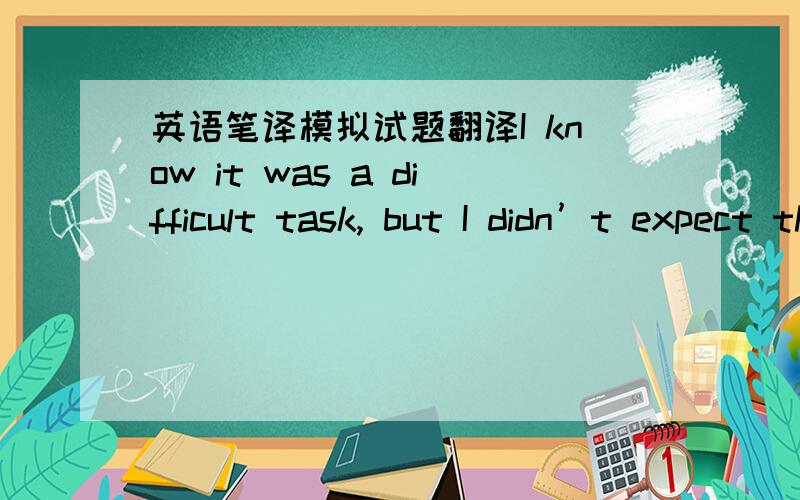英语笔译模拟试题翻译I know it was a difficult task, but I didn’t expect that a confident person like you should have chickened out on that.这句话后半句的翻译为,但没想到你这样自信的人也会畏缩,should have done意为
来源:学生作业帮助网 编辑:作业帮 时间:2024/07/11 13:17:24

英语笔译模拟试题翻译I know it was a difficult task, but I didn’t expect that a confident person like you should have chickened out on that.这句话后半句的翻译为,但没想到你这样自信的人也会畏缩,should have done意为
英语笔译模拟试题翻译
I know it was a difficult task, but I didn’t expect that a confident person like you should have chickened out on that.
这句话后半句的翻译为,但没想到你这样自信的人也会畏缩,
should have done意为本应该……,如果从这个意思理解,后半句应该怎么翻译?如果不是,那应该如何解释
英语笔译模拟试题翻译I know it was a difficult task, but I didn’t expect that a confident person like you should have chickened out on that.这句话后半句的翻译为,但没想到你这样自信的人也会畏缩,should have done意为
should + have + 过去分词
1.表示主观推测
指对可能已经发生的情况作主观猜测,其意为“大概已经”“应该已经”.如:
The letter should have arrived by now.信现在该到了.
I can’t think why he should have been so angry.我想不通他怎么会这样生气.
注:该用法中的should也可换成ought to,意思不变.如:
The train should [ought to] have already left.火车大概已经开走了吧.
2.表示责备或批评
表示过去本来应该发生而实际上没有发生的情况,往往含有遗憾、责备、批评等感情色彩,通常可译为“应该”“本来应该”等.如:
You should have reported the matter to the police.你本应该把这件事报告警察.
I beg your pardon.I suppose I should have knocked.对不起,我想我应该先敲一下门的.
如果是否定式,则表示本来不该发生的情况却发生了.如:
You shouldn’t have opened her letter.你是不应该拆她的信的.
She shouldn’t have stood in a queue.She should have got tickets from the machine.她本来就不该去排队,她应该在售票机那儿买票.
注:该用法中的should也可换成ought to,意思不变.如:
You should [ought to] have told us earlier.你应该早点告诉我们的.
You shouldn’t [oughtn’t to] have parked there.你本不该把车停在这里.
3.表示惊讶
表示对已经发生的情况表示惊讶或不理解,通常含有“竟然”的意味.如:
It is a pity that he should have failed in the exam.他考试竟然没有及格,真是可惜.
I can’t think why he should have said that it was my fault.我真不明白,他怎么竟然说这是我的过错.
It’s strange that he should have left without telling us.奇怪,他竟没有和我们说一声就走了.
4.用于虚拟语气
在虚拟条件句中,当谈论过去的情况时,其句型通常是:主句用“could / would / should /might +have+过去分词”,从句用过去完成时.如:
If I had seen her I should have invited her.我当时要是看到她的话我本会邀请她的.
If he had received the present,he should have thanked her.如果他收到了礼物,他是应当向她道谢的.
I should not have laughed if I had thought you were serious.如果我想到你是认真的,我就不会笑了.
这上面的说的比较详细 我懒得打了 以前主要说的是虚拟语气但是这里是表示“竟然”